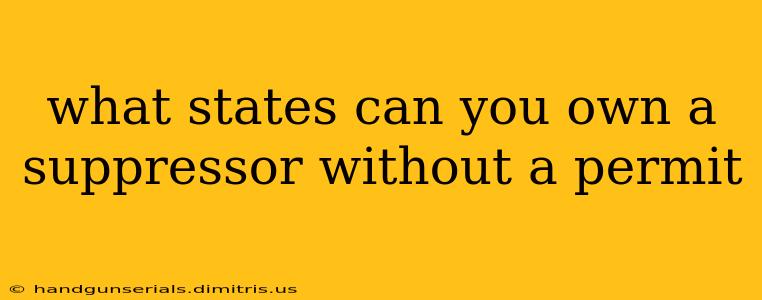The question of suppressor ownership without a permit is a complex one, varying significantly by state. There's no single answer, and it's crucial to understand the nuances of federal and state regulations before purchasing or possessing a suppressor. It's illegal to possess a suppressor without the proper licensing at the federal level, regardless of state laws. This means even in states with seemingly relaxed regulations, you'll still need to navigate the federal process.
While no state allows suppressor ownership entirely without a permit, some have less stringent regulations than others. The key difference lies not in outright permission but in the ease and speed of the permitting process. Some states streamline the process, making it less burdensome for law-abiding citizens, while others maintain stricter controls.
Understanding the Federal Process: The NFA
Before delving into state-specific laws, it's vital to understand the National Firearms Act (NFA) of 1934. This federal law regulates the manufacture, transfer, and possession of certain firearms, including suppressors (also known as silencers). The NFA requires individuals to obtain a tax stamp from the Bureau of Alcohol, Tobacco, Firearms and Explosives (ATF) before owning a suppressor. This involves a background check and a waiting period. This federal requirement is non-negotiable, regardless of state laws.
States with Relatively Streamlined Suppressor Permitting:
Several states have worked to simplify the process of obtaining the necessary ATF tax stamp for suppressor ownership, making it less cumbersome than in other jurisdictions. These states often expedite the state-level portion of the process or have laws that don't add extra hurdles beyond the federal requirements. It's important to emphasize that these states still require the federal ATF stamp. Examples include (but are not limited to):
- Arizona: Arizona has a relatively streamlined process for obtaining the necessary paperwork.
- Kansas: Kansas doesn't add significant barriers to the federal requirements.
- Kentucky: Similar to Kansas and Arizona, Kentucky's regulations tend to align with federal law without adding substantial state-level restrictions.
- Montana: Montana typically processes applications efficiently, focusing primarily on meeting federal requirements.
It's crucial to verify the most up-to-date regulations for each state, as laws change. Always check with the relevant state and federal agencies for the latest information.
States with More Restrictive Suppressor Laws:
Many states maintain more rigorous regulations surrounding suppressor ownership, potentially adding significant delays or complications to the federal permitting process. These states may have waiting periods, additional fees, or stricter background check requirements beyond what's mandated at the federal level. Examples include:
- California: California has some of the most restrictive firearm laws in the country, including those related to suppressors.
- New York: New York also has stringent regulations that make the acquisition of a suppressor significantly more challenging.
- Massachusetts: Massachusetts maintains tight control over firearm ownership, including suppressors.
This list is not exhaustive, and the specific regulations vary widely. It's vital to consult individual state laws and regulations before attempting to purchase a suppressor.
Disclaimer:
This information is for educational purposes only and does not constitute legal advice. The laws concerning suppressor ownership are complex and subject to change. Always consult with a qualified legal professional and the appropriate state and federal agencies before purchasing or possessing a suppressor. Failure to comply with federal and state laws can result in significant legal penalties.

